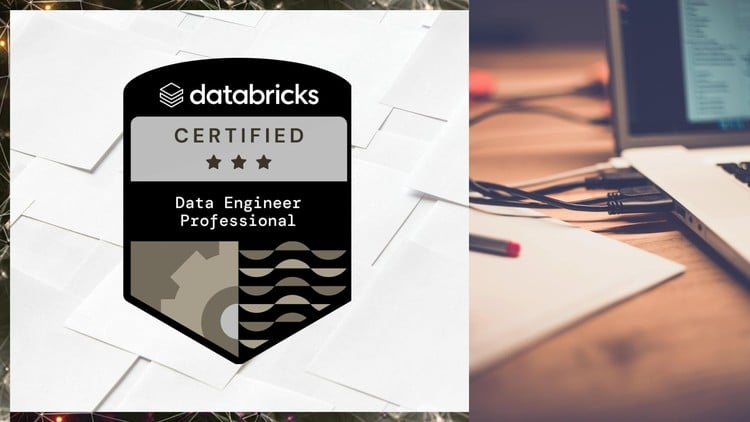
High-quality practice exams to boost confidence, identify weak areas, and prepare you for real test success
👥 3 students
Add-On Information:
Note➛ Make sure your 𝐔𝐝𝐞𝐦𝐲 cart has only this course you're going to enroll it now, Remove all other courses from the 𝐔𝐝𝐞𝐦𝐲 cart before Enrolling!
- Course Overview
- These practice exams meticulously simulate the Certified Data Engineer professional certification test, providing an authentic preview of challenges and question formats.
- Dive into comprehensive tests covering all key domains stipulated by leading data engineering certifications for thorough preparation.
- Gain invaluable experience in time management and strategic problem-solving under pressure, mirroring the real exam to build endurance.
- Each practice exam serves as a powerful diagnostic tool, helping you precisely identify strengths and specific knowledge gaps.
- Leverage iterative practice to refine understanding, reinforce complex concepts, and systematically eliminate weak spots.
- Benefit from detailed, insightful explanations for every question, turning each attempt into a valuable learning opportunity.
- Questions are regularly updated to align with the latest industry standards, technological advancements, and current certification blueprints.
- Requirements / Prerequisites
- Foundational Data Engineering Knowledge: Solid understanding of core principles, data structures, algorithms, and database fundamentals.
- Cloud Platform Familiarity: Basic working knowledge of at least one major cloud provider (e.g., AWS, Azure, GCP) and its core data services.
- Big Data Concepts: Familiarity with big data ecosystems and frameworks like Apache Spark or Hadoop is beneficial.
- Proficiency in SQL: Strong command of SQL for querying, manipulation, and schema definition is crucial.
- Programming Basics: Understanding of programming logic (Python/Java) aids in data pipeline logic.
- ETL/ELT Understanding: Prior experience or theoretical knowledge of Extract, Transform, Load (ETL) or Extract, Load, Transform (ELT) processes.
- Certification Ambition: Strong desire to earn the Certified Data Engineer professional credential and commitment to rigorous exam preparation.
- Skills Covered / Tools Used
- Advanced Data Modeling & Schema Design: Design scalable data models for relational, NoSQL, data warehouse (star/snowflake), and data lake architectures.
- ETL/ELT Pipeline Development & Optimization: Design, implement, and optimize complex data ingestion, transformation, and loading pipelines.
- Big Data Processing Frameworks: Utilize and troubleshoot distributed processing tools like Apache Spark, Hadoop, Flink, and Kafka.
- Cloud-Native Data Services: Apply deep understanding of cloud services including object storage (S3, ADLS, GCS), managed data warehouses (Redshift, Synapse, BigQuery), and serverless compute.
- Data Governance, Security, & Compliance: Implement best practices for data security, access control, encryption, auditing, and regulatory compliance.
- Performance Tuning & Cost Optimization: Optimize data queries, indexing strategies, cluster configurations, and resource allocation for efficiency and cost management.
- Real-time Data Streaming Architectures: Design and implement solutions for processing and analyzing data streams (e.g., Kafka, Kinesis, Pub/Sub).
- Data Warehousing & Data Lakehouse Concepts: Understand architectural principles, advantages, and implementation strategies for modern data storage solutions.
- NoSQL Database Management: Comprehend various NoSQL database types (document, key-value, columnar, graph) and their appropriate use cases.
- Workflow Orchestration & Automation: Familiarity with tools and concepts for automating and scheduling complex data pipelines (e.g., Apache Airflow, AWS Step Functions, Azure Data Factory).
- Monitoring, Logging, & Alerting: Establish comprehensive monitoring and logging strategies for data pipelines to ensure operational health and rapid troubleshooting.
- Data Quality & Validation: Apply techniques and tools for ensuring data integrity, consistency, and accuracy throughout the data lifecycle.
- Infrastructure as Code (IaC) Principles: Exposure to automating infrastructure deployment for data solutions (e.g., Terraform, CloudFormation).
- Benefits / Outcomes
- Elevated Exam Confidence: Significantly boost self-assurance by engaging with high-quality practice questions, diminishing test-day anxiety.
- Precise Knowledge Gap Identification: Systematically pinpoint weak areas, allowing efficient and effective study efforts.
- Mastery of Exam Time Management: Hone ability to strategically allocate time per question, ensuring exam completion within duration.
- Strategic Test-Taking Acumen: Develop robust strategies for analyzing questions, eliminating incorrect answers, and making informed choices.
- Reinforced Core Data Engineering Concepts: Solidify grasp of fundamental and advanced principles through practical application.
- Authentic Exam Environment Experience: Become familiar with the structure and pressure of the actual certification exam, minimizing surprises.
- Guaranteed Comprehensive Domain Coverage: Ensure every critical domain of the certification blueprint is thoroughly reviewed and tested.
- Accelerated Certification Journey: Streamline your path to certification by focusing on high-impact areas and rapidly improving readiness.
- Substantially Increased Pass Rate: Dramatically improve your statistical probability of passing the professional exam on your first attempt.
- Enhanced Professional Credibility: Successfully earning this certification validates expertise, distinguishing you as a highly competent data engineer.
- PROS
- Targeted Exam Readiness: Specifically designed for the Certified Data Engineer professional exam, ensuring highly efficient study.
- Realistic Simulation: Offers an authentic exam experience with timed sections and diverse question types, reducing test-day shock.
- Diagnostic Feedback: Provides detailed explanations, enabling precise identification and correction of knowledge gaps.
- Confidence Builder: Repeated exposure to challenging questions in a low-stakes environment significantly reduces exam anxiety.
- Comprehensive Coverage: Thoroughly addresses all key domains and topics expected in the certification blueprint.
- Cost-Effective Preparation: An affordable alternative to expensive training, providing focused practice for success.
- CONS
- No Foundational Teaching: This course assumes prior knowledge; it does not teach core data engineering concepts from scratch but focuses solely on exam practice and validation.
Learning Tracks: English,IT & Software,IT Certifications
Found It Free? Share It Fast!